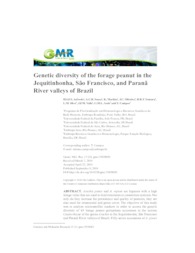Genetic diversity of the forage peanut in the Jequitinhonha, São Francisco, and Paranã River valleys of Brazil.
Genetic diversity of the forage peanut in the Jequitinhonha, São Francisco, and Paranã River valleys of Brazil.
Author(s): AZÊVEDO, H. S. F. S.; SOUSA, A. C. B.; MARTINS, K.; OLIVEIRA, J. C.; TEIXEIRA, R. B.; SILVA, L. M. da; VALLS, J. F. M.; ASSIS, G. M. L. de; CAMPOS, T. de
Summary: Arachis pintoi and A. repens are legumes with a high forage value that are used to feed ruminants in consortium systems. Not only do they increase the persistence and quality of pastures, they are also used for ornamental and green cover. The objective of this study was to analyze microsatellite markers in order to access the genetic diversity of 65 forage peanut germplasm accessions in the section Caulorrhizae of the genus Arachis in the Jequitinhonha, São Francisco and Paranã River valleys of Brazil. Fifty-seven accessions of A. pintoi and eight of A. repens were analyzed using 17 microsatellites, and the observed heterozygosity (HO), expected heterozygosity (HE), number of alleles per locus, discriminatory power, and polymorphism information content were all estimated. Ten loci (58.8%) were polymorphic, and 125 alleles were found in total. The HE ranged from 0.30 to 0.94, and HO values ranged from 0.03 to 0.88. By using Bayesian analysis, the accessions were genetically differentiated into three gene pools. Neither the unweighted pair group method with arithmetic mean nor a neighbor-joining analysis clustered samples into species, origin, or collection area. These results reveal a very weak genetic structure that does not form defined clusters, and that there is a high degree of similarity between the two species.
Publication year: 2016
Types of publication: Journal article
Unit: Embrapa Acre
Keywords: Acesso, Amendoim forrageiro, Arachis pintoi, Arachis repens, Diversidade genética, Forage legumes, Forage peanut, Genetic markers, Genetic variation, Leguminosa forrageira, Leguminosas forrajeras, Marcador genético, Marcador microssatélite, Marcadores genéticos, Marcadores microssatélites, Microsatellite repeats, Pastagem, Pastizales, Pastures, Repeticiones de microsatélite, Vale do Jequitinhonha, Vale do Rio Paraná, Vale do Rio São Francisco, Variación genética, Variação genética
Observation
Some of Embrapa's publications are published as ePub files. To read them, use or download one of the following free software options to your computer or mobile device. Android: Google Play Books; IOS: iBooks; Windows and Linux: Calibre.
Access other publications
Access the Agricultural Research Database (BDPA) to consult Embrapa's full library collection and records.
Visit Embrapa Bookstore to purchase books and other publications sold by Embrapa.

